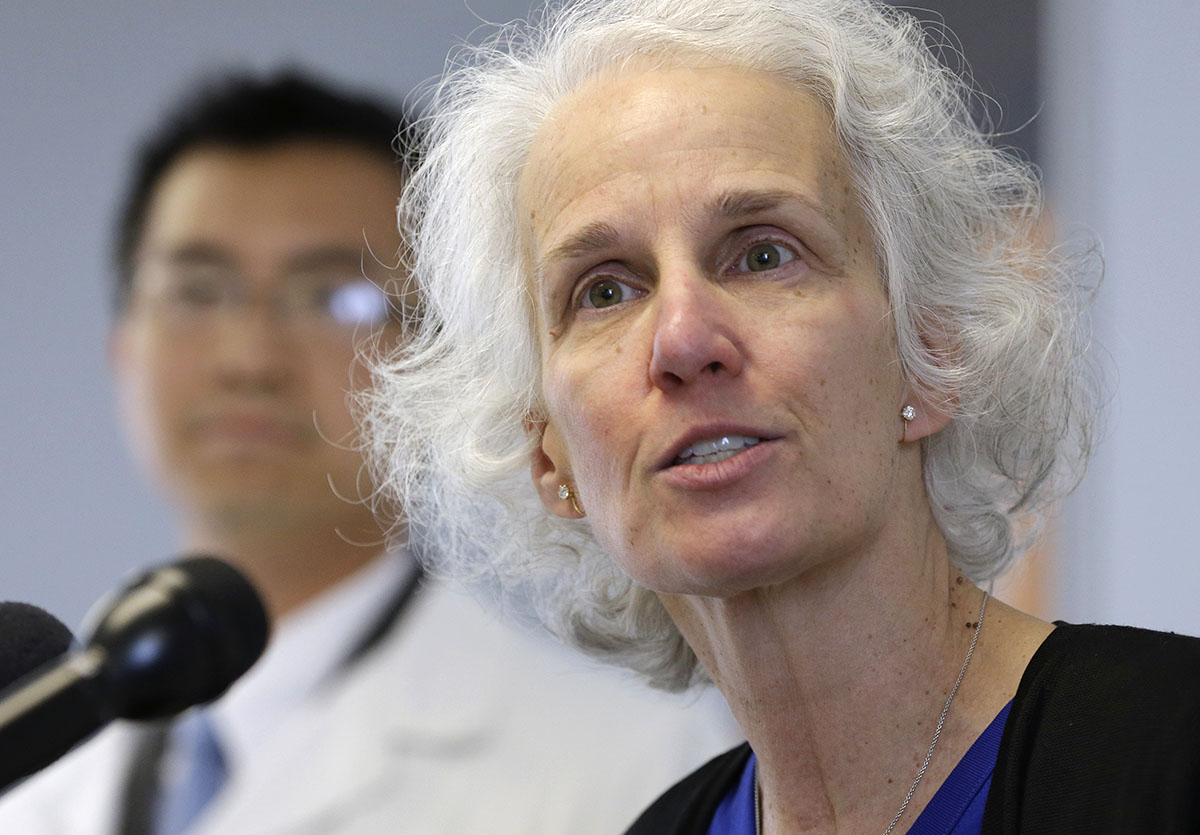Is Boston Really Prepared to Handle Ebola?

Dr. Anita Barry, right, takes questions from members of the media as Huy Nguyen, medical director and interim executive director of Boston Public Health Commission, left, looks on. (Photo via AP)
There’s a pessimistic way to look at Boston’s current readiness to handle a complex public health situation like the Ebola scare, but please stay tuned for the optimistic version that follows.
Barbara Ferrer, Boston’s longtime, trusted top health official, just left City Hall earlier this month; the move (although widely expected, since Marty Walsh stripped her of cabinet status) has left a void. The search process for a new Boston Public Health Commissioner has barely begun. Interim Commissioner Huy Nguyen is splitting those duties with his regular job of medical director of the Commission.
Meanwhile, the city’s top health official, thanks to the mayor’s reorganization, is young Health and Human Services chief Felix Arroyo, a relative neophyte both on health matters and in running a large department, and, by the way, a guy who’s a little busy right now running point on the emergency response to the Long Island bridge closing.
On the state side of the ledger, the Ebola situation comes as Patrick administration personnel are editing resumes and sneaking out for interviews in the waning days before a new boss takes over. Most notably, it was reported just today that Public Health Commissioner Cheryl Bartlett will leave in December for other employment.
More disconcertingly, the Executive Office of Health and Human Services (EOHHS) has been under Governor Deval Patrick … how shall I put this … a great festering vat of managerial incompetence, from the crime lab fiasco to the DCF catastrophe to the pharmaceutical compounding disaster to the medical marijuana misadventure. I would go on, but I’m running out of synonyms for “fuck-up.”
So, as I say, one could look at the political backdrop and worry that Boston and Massachusetts might not be ready to handle a major medical health crisis like the one potentially presented by Ebola.
There is a far more optimistic view, however.
On the City Hall front, Nguyen and infectious disease director Anita Barry are experienced veterans who should be perfectly positioned to handle the medical protocol side of things. (Walsh spokesperson Kate Norton informs me that Barry has addressed “tuberculosis in the homeless… anthrax/white powder scares, H1N1 influenza, and MERS.” And she’s still around, so, that says something.) And the re-org will allow the medical protocol experts to concentrate on that, separate from the cabinet-level concerns of coordinating among agencies and jurisdictions.
Similarly, state epidemiologist Al DeMaria and Department of Public Health director of epidemiology and immunization Larry Madoff are veterans who don’t come and go with the changes at the corner office. “DPH has a lot of institutional and technical expertise,” EOHHS spokesperson Alec Loftus assures me.
And on the administrative front, I hear nothing but good things about the job EOHHS Secretary John Polanowicz has done since taking over in January 2013—and, as Loftus points out, Polanowicz, former CEO of St. Elizabeth’s, comes from the hospital world and is well suited to working with those institutions, which is where the real action is. And, you know, I’m in no position to judge their infectious disease outbreak response capabilities, but I don’t think there is any set of medical institutions anywhere in the world I would trust more to get this stuff right.
And on the interagency coordination side, I’m told that the Massachusetts Emergency Management Agency (MEMA) is running point on that, and (until the next time they let us down) who doesn’t feel reassured when those vests come out. (MEMA director Kurt Schwartz wore his at today’s presser; Governor Deval Patrick chose not to. If they could find some excuse to get Martha Coakley into one of those vests, I think she’d lock up the election.)
So, do you buy the first, all-hope-is-lost perspective? Or the second, we’re-in-good-hands theory?


